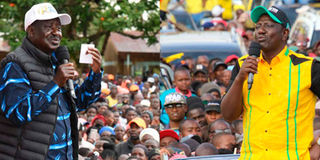Odinga’s attitude to hustler’s stinks in the nostrils of God and country

Azimio presidential candidate Raila Odinga (left) and his Kenya Kwanza counterpart William Ruto.
Clearly, Azimio presidential candidate Raila Odinga has a problem with the poor and downtrodden in our country.
And there have been so many instances that leave no doubt that Mr Odinga treats the people at the bottom of the economic pyramid as habitual irritants. This is doubly shocking from a man who has expressed interest – for the fifth time, and four times in a row – to be the chief executive of Kenya.
On perhaps the biggest day in this election season, when he was expected to explain what he had in store for the country if at all he were to become president, Mr Odinga opted to pour scorn, ridicule and threaten a retail business that employs more than two million people and is depended upon by close to six million citizens.
His comment that the mitumba business is undesirable because it is the product of the dead is a continuation of his obnoxious attitude towards the poor and the weak. He has been on record times without number depicting mama mboga, boda boda riders, wheelbarrow and mkokoteni (cart) pushers takataka (rubbish).
This hostility and spite cannot just be because the hustlers are the bedrock of Deputy President and UDA presidential candidate William Ruto’s support.
This is a frame of mind that looks at those who have been left out by trickle-down economics as nothing more but workers for those at the apex of the pyramid. And specifically for Mr Odinga, the hustlers are nothing but chattels in his political matrix.
The attitude also makes the dubious assumption that poor people are third-rate citizens and exist at the mercy of those who ‘have made it’.
Mr Odinga threw one of the many takataka epithets at the funeral of businessman and politician Nginyo Kariuki in Tigoni, Kiambu County. And he could not see the cruel irony. Nginyo Kariuki was a threadbare politician, but a resoundingly successful businessman.
But unlike Mr Odinga, he started at the bottom of the bottom and pulled himself up by his bootstraps to be what he became. An imposing building that bears his name in the heart of the city is a true testament of this success.
Recently, and on the day Mr Odinga named his running mate, he narrated how they both went to a restaurant in the city. And he was shocked – nay annoyed – that a university graduate who had had no ‘formal job’ was into restaurant business vending fish.
If he were to become president, he opined, there would be no such situations. Graduates would get ‘better jobs’. This is the frame of mind of a leader who has no clue what happens and should continue to happen in Kenya. A graduate who has gone to business should be applauded and boosted to do better.
Is it imaginable that Mr Odinga could not fathom that the restaurant owner had created employment, become a taxpayer and was creating wealth? If this is not so evident to him, how does he expect the economy to grow, generate jobs, increase tax revenues and make citizens wealthy?
And if these basic truths are not this obvious, what was the whole manifesto business he was on last Monday evening for? There can be only one conclusion: It was nothing but razzmatazz for razzmatazz’s sake.
Trickle-down economics, where the majority must wait for a few to create wealth and then throw morsels downwards, is the problem with Kenya. And Mr Odinga is clearly the prime crusader of the status quo.
Citizens can clearly see he is yesterday’s quantity and he does not have the capacity to imagine, leave alone plan the future. It is the novel and dynamic Bottom Up Economic model proposed by Dr Ruto that will rule the roost.
It is not surprising that the novel economic model has caught the imagination of the nation among the young and old, men and women. It charts a future where Mr Odinga and his ilk cannot determine for anyone which economic endeavour to pursue, including those of the wheelbarrow and mkokoteni pushers.
And the mantra that every hustle matters is, therefore, the wisdom of the ages. No business or trade or craft is better than the other.
And that is where the government comes in to ensure that the work environment is conducive to progress, to offer cheap credit and enact laws to protect every business or trade, among other measures. This way, many enterprises will grow and more people will start businesses. The country will be the richer for it in wealth creation and a shot for the much needed taxes.
Kenya has close to five million young people with post-secondary education qualifications, but no gainful engagement.
The government that will be elected on August 9 must have novel programmes and policies that create jobs and boost business.
The jobless are looking up for salvation in the next 57 days.
Mr Odinga has shown, in word and deed, that he has nothing to offer; he will take away even what is available.
The writer works in the William Ruto presidential campaign





